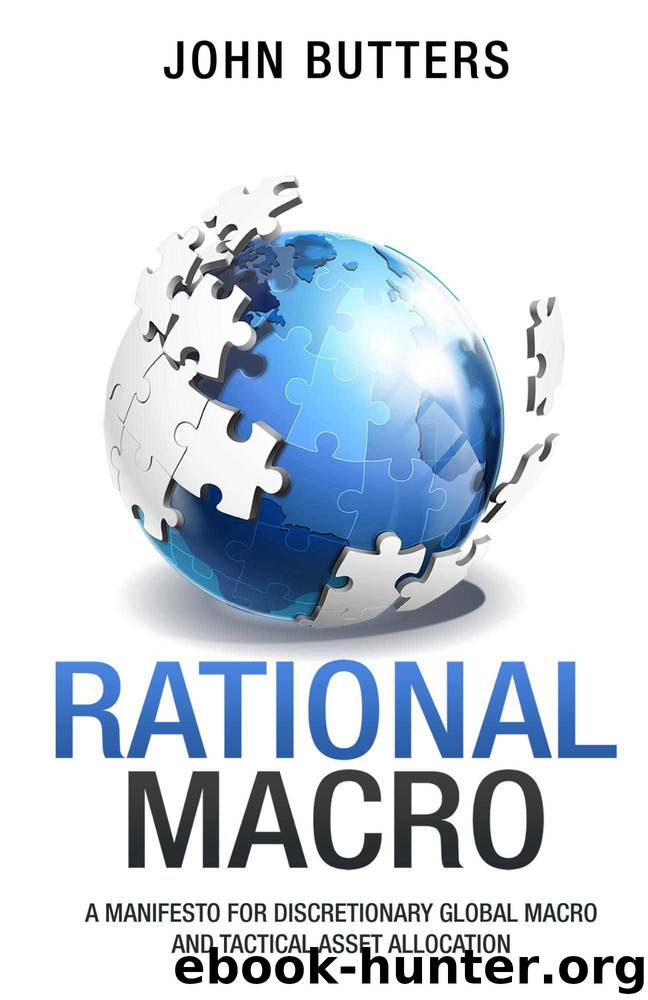Rational Macro by John Butters

Author:John Butters
Language: eng
Format: mobi
Published: 2013-07-16T18:30:00+00:00
4.2. From Function to Process
The reader will recall that we have defined fundamental macro as the practice of taking and varying exposures to macro instruments (interest rates, currencies, equity and credit indices and commodities) and to the spreads or ratios between them, on a discretionary basis, in response to a changing environment. It is not macroeconomics, which has at least some of the characteristics and institutions of a true science. Nor is it investment, which has a corpus of common practices and models, the study of which is a first step in the development of expertise in the field (the analysis of company accounts, discounted cash flow modelling, industry analysis, credit analysis, and so on). Fundamental macro has no institutions and no generally-agreed corpus of knowledge. The task of this section is to create some elements of a macro engineering process that will, at least partially, replicate the functions performed by the institutions of science in other fields.
First, the institutions of education. Nowhere is there a course of study on how to practice fundamental macro in a profitable way. Nor is there a clear body of formal knowledge that pertains to the field. There are barely any books on the subject, and no professional standards. A few outstanding practitioners – Soros, Dalio – have written books, but their works do not provide a template for how to follow in their footsteps; otherwise, the methods of the experts can only be gleaned from collections of interviews that are wonderful in themselves, but all too brief. As a consequence, though the practitioner my read widely and study hard, it is not at all clear what he should be reading and studying, and, as he reads more things, whether his academic understanding of fundamental macro is advancing or not.
In chapter 3, we conceived macro engineering as a combination of market naturalism and model-building. That conception may be used as the basis for the macro engineer to select appropriate subjects for study.
As a market naturalist, he should read market and economic history, books on contemporary politics and political institutions, on the structure of markets and on the methods of various practitioners and central banks, and other, similar works. The requirement for wide knowledge means that he should spread his reading widely. He should make a conscious effort to identify subjects, periods, institutions, actors and markets of which he is ignorant and to fill the gaps.
As a model-builder, the macro engineer should understand the models of economics in particular, and the social sciences in general, and should seek out and compare various alternative methods of approaching each question. Some modelling approaches, such as accounting or cost-benefit analysis, are relatively easy to apply, whereas others, such as econometrics and game theory, can be rather more complex. No matter: the macro engineer should gain a good working knowledge of them, and master them if he can. Since one cannot attain mastery of a technique without practising it, it will be essential to apply new models and methods as one discovers them.
Download
This site does not store any files on its server. We only index and link to content provided by other sites. Please contact the content providers to delete copyright contents if any and email us, we'll remove relevant links or contents immediately.
Rich Dad Poor Dad by Robert T. Kiyosaki(6633)
Pioneering Portfolio Management by David F. Swensen(6301)
How To Win Friends and Influence People by Dale Carnegie(4513)
The Money Culture by Michael Lewis(4207)
The Dhandho Investor by Mohnish Pabrai(3766)
The Wisdom of Finance by Mihir Desai(3748)
Liar's Poker by Michael Lewis(3450)
Fooled by Randomness: The Hidden Role of Chance in Life and in the Markets by Nassim Nicholas Taleb(3124)
The ONE Thing by Gary Keller(3071)
Mastering Bitcoin: Programming the Open Blockchain by Andreas M. Antonopoulos(3046)
The Intelligent Investor by Benjamin Graham Jason Zweig(3042)
The Psychology of Money by Morgan Housel(3037)
Rich Dad Poor Dad: What The Rich Teach Their Kids About Money - That The Poor And Middle Class Do Not! by Robert T. Kiyosaki(2958)
Investing For Dummies by Eric Tyson(2955)
How to Day Trade for a Living: Tools, Tactics, Money Management, Discipline and Trading Psychology by Andrew Aziz(2949)
How to Win Friends and Influence People by Dale Carnegie(2915)
Market Wizards by Jack D. Schwager(2701)
How to Pay Zero Taxes, 2018 by Jeff A. Schnepper(2655)
Zero Hour by Harry S. Dent Jr. & Andrew Pancholi(2649)
